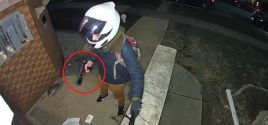Welcome to Egypt: San Francisco railway shuts off cell phone service to silence protestersby Dave Id, San Francisco Bay ViewAug. 14, 2011 |
Popular 
IDF Opens Fire on Syrians Protesting Israel's Expanding Occupation of South Syria

Putin Accuses 'Ethnic Jews' of Tearing Russian Orthodox Church Apart

Saudi National Rams Car Into Germans at Christmas Market in Suspected Terrorist Attack [UPDATED 2X]

Ohio Senate Passes Bill Aimed at Outlawing Criticism of Israel, Criminalizing Gospel

Nick Fuentes Targeted by Gunman at His Home After Being Doxed on Elon Musk's Twitter [UPDATED]
  The San Francisco Bay Area, historic birthplace of the Free Speech movement and a pioneer in the digital age, is now apparently the first place in the United States to have had its electronic communications deliberately disabled in order to pre-empt a political protest. As an act of prior restraint against potential protesters’ free expression, the Bay Area Rapid Transit agency cut power to the underground mobile phone antennas within the BART system for several hours on Aug. 11, thereby denying tens of thousands of evening commuters access to broadband internet networks, telephone service and even 911 calls. The San Francisco Bay Area, historic birthplace of the Free Speech movement and a pioneer in the digital age, is now apparently the first place in the United States to have had its electronic communications deliberately disabled in order to pre-empt a political protest. As an act of prior restraint against potential protesters’ free expression, the Bay Area Rapid Transit agency cut power to the underground mobile phone antennas within the BART system for several hours on Aug. 11, thereby denying tens of thousands of evening commuters access to broadband internet networks, telephone service and even 911 calls.Civil liberties organizations such as the Electronic Frontier Foundation (EFF) and the American Civil Liberties Union (ACLU), as well as the hacktivist group known as Anonymous, are now vociferously objecting. Without even realizing how premature it was to smirk and brag to the corporate media about having disabled the antennas after service was cut, BART appears to have stepped in another big pile of shit as it so often tends to do. Besides the public shaming it is now receiving across the internet in an ever-growing number of articles and op-eds, FCC, legal and hacktivist repercussions for the agency may be yet to come. The protest BART hyperventilated about never even happened. At first, when called out on the phone service shutdown last night, BART police Lt. Andy Alkire bragged that disabling the antennas was “a great tool to utilize for this specific purpose.” BART PR spokesperson Linton Johnson was seen smirking about the service cut on television newscasts – when he wasn’t trying to shift responsibility for the decision out of his press department. Today however, from the New York Times to CNET to Fox News to Al Jazeera, the internet is flooded with hundreds of stories about the apparent first-ever anti-protest disabling of cell phone antennas in America – and it’s not likely BART officials think their decision to disable the phone antennas is so cute and funny any more. BART board members have yet to make a public statement regarding the matter. Not surprisingly – to anyone who has followed BART’s record of police violence, cover-ups and evolving stories over time – the agency has lied repeatedly about having cut power to the communications antennas to which they have access. A BART official first denied that the agency had even disabled mobile phone service. Later, regarding who at the agency ordered the service shutdown, Lt. Andy Alkire told a TV news station that the decision came from the media relations department. Linton Johnson attempted to deny knowledge of where the decision came from, but then admitted that his department “suggested” it when confronted with Alkire’s statement. This morning, BART followed up by releasing a written statement claiming that it had asked mobile phone carriers to cut service for them. BART’s deputy chief communications officer James Allison then fessed up that “BART staff or contractors shut down power to the nodes,” adding that BART notified cell carriers after the action was taken. A spokesperson for Sprint, however, said that Sprint “learned about the service disruption from the news.” BART continues to insist, as reported in AP wire stories, that only four stations in downtown San Francisco had their service disabled – Embarcadero, Montgomery, Powell, Civic Center – but service was also noticeably down at 16th Street Mission station in San Francisco and downtown Oakland underground stations. It has not yet been confirmed if antennas were disabled in other underground stations throughout the entire BART district. BART’s spin machine has attempted to flip onto protesters complaints expressed about decisions BART made during the July 11 Justice for Charles Hill action in downtown San Francisco stations – namely that BART ran trains through crowded stations at dangerously high speeds during the demonstration – in order to justify their own disabling of the antennas, by first claiming in an advisory about a potential Aug. 11 protest that their primary motivation was safety and, in another release the following day, that demonstrators would create “unsafe conditions.” In an attempt to create an atmosphere of fear and danger around BART protests, Linton Johnson encouraged the public to “Report unsafe behavior. Do not confront protesters. Stay out of harm’s way.” Of course, protesters at BART actions have never hurt anyone, emphasizing through repeated exhortations that demonstrators not even “deny passengers egress from trains or station,” yet BART police continue to beat and kill passengers. And so it appears BART’s primary rationalization for their action rests on their disingenuous claim to have been acting on behalf of passenger safety rather than to block the content of a protest, which would be more problematic legally. Trying to personalize the sense of sheer terror demonstrators create, BART police deputy chief Benson Fairow played his role by telling the media, “It was a recipe for disaster. … The fact that they started to conspire to commit illegal actions on the station platform was our concern. I asked myself: If my wife, mother or daughter was on that platform, would I want them to be in that situation?” In another news outlet, Fairow made use of his family in a more gruesome manner: “Would I want my wife or daughter to get kicked (onto BART tracks) in a protest that we could have avoided?” It is unclear how protesters with working mobile phones would be more likely to cause his wife to be shoved onto train tracks than protesters without phones. Yet still, on the basis of this anecdotal fear factor, BART would have us believe the decision to cut mobile phone service throughout the system was made, a supposedly sensible trade-off between very real speech and very imaginary harm to passengers. ...Continued |



